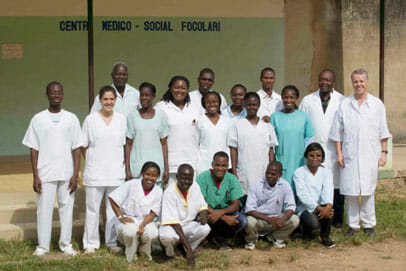
Jun 29, 2015 | Focolare Worldwide
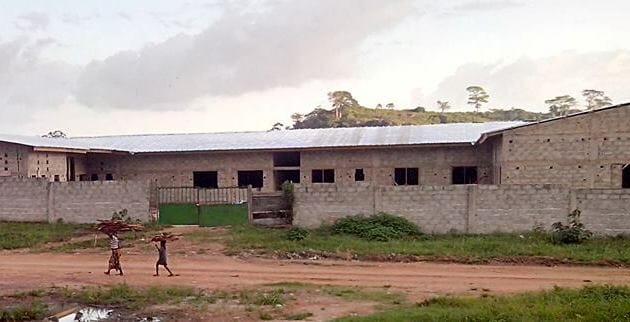 Estelle is the eldest of eight brothers, in a family from Ivory Coast who, after having worked as a secretary at a medical clinic in Abidjan, moved to Man in 2006 where she volunteers especially as a contact person with sponsors of a medical centre run by the Focolare Movement. When the project finished, she decided to expand her administrative skills. Meanwhile, her father died and she had to provide financial support for the family. She applied for and received a scholarship from Fraternity with Africa. Now, along with working, she is specializing through distance learning courses in “Administration of NGO organisations and non-profit associations” at university in Burkina Faso. After finishing her studies, with the support of a tutor and of AMU, she will travel to Burundi where she will complete one stage in administration and finance at CASOBU, an NGO that promotes human and community development through acitivites and projects based on the values of sharing and sustainable development. “It was a nice concrete experience for me, because it was the first time I travelled outside Ivory Coast and got to know other cultures and learn much from CASOBU; their approach to microcredit, for example. When I returned to my own country, I decided to propose that same microcredit model, beginning with the people I knew. We’ve already begun two groups that up until now seem to be functioning quite well. . .“ Everything she received, spurred Estelle to become involved in Fraternity with Africa: “When I finished my studies, I thought that since I couldn’t make a financial contribution, I could share my time and talents with the project.” So, on the one hand there was the work in adminstration, running and finances of the medical centre, and on the other hand keep up relationships, taking care of the adminstration and, from within the adminstration, she evaluates scholarship candidates and accompanies the students who receive them.
Estelle is the eldest of eight brothers, in a family from Ivory Coast who, after having worked as a secretary at a medical clinic in Abidjan, moved to Man in 2006 where she volunteers especially as a contact person with sponsors of a medical centre run by the Focolare Movement. When the project finished, she decided to expand her administrative skills. Meanwhile, her father died and she had to provide financial support for the family. She applied for and received a scholarship from Fraternity with Africa. Now, along with working, she is specializing through distance learning courses in “Administration of NGO organisations and non-profit associations” at university in Burkina Faso. After finishing her studies, with the support of a tutor and of AMU, she will travel to Burundi where she will complete one stage in administration and finance at CASOBU, an NGO that promotes human and community development through acitivites and projects based on the values of sharing and sustainable development. “It was a nice concrete experience for me, because it was the first time I travelled outside Ivory Coast and got to know other cultures and learn much from CASOBU; their approach to microcredit, for example. When I returned to my own country, I decided to propose that same microcredit model, beginning with the people I knew. We’ve already begun two groups that up until now seem to be functioning quite well. . .“ Everything she received, spurred Estelle to become involved in Fraternity with Africa: “When I finished my studies, I thought that since I couldn’t make a financial contribution, I could share my time and talents with the project.” So, on the one hand there was the work in adminstration, running and finances of the medical centre, and on the other hand keep up relationships, taking care of the adminstration and, from within the adminstration, she evaluates scholarship candidates and accompanies the students who receive them.  The medical centre in Man began in 2002, during the civil war when the hospital was closed. It was hosted in an apartment with three rooms. Then, in 2008, the current Social Medical Centre was opened with visiting rooms, one-day recovery rooms, pharmacy and laboratory. But now the number of patients has gown so much that a new centre is being constructed where diagnostic facilities will be added, and programmes for the reduction of infant malnutrition in the region of Man. There will also be training programmes for mothers, in the field of nutrition. The health situation of the people in Man is problematic. Medical bills are paid in advance and without the possiblity of riembursement. Given the poverty of the population, families are generally able to cover the cost of food and school fees. But if illness comes knocking, they only go the doctor when the illness is at its worst, and the patient is dying. The new medical centre will be able offer medical care to six thousand adult patients and three thousand children. See: AMU notizie 2/2015
The medical centre in Man began in 2002, during the civil war when the hospital was closed. It was hosted in an apartment with three rooms. Then, in 2008, the current Social Medical Centre was opened with visiting rooms, one-day recovery rooms, pharmacy and laboratory. But now the number of patients has gown so much that a new centre is being constructed where diagnostic facilities will be added, and programmes for the reduction of infant malnutrition in the region of Man. There will also be training programmes for mothers, in the field of nutrition. The health situation of the people in Man is problematic. Medical bills are paid in advance and without the possiblity of riembursement. Given the poverty of the population, families are generally able to cover the cost of food and school fees. But if illness comes knocking, they only go the doctor when the illness is at its worst, and the patient is dying. The new medical centre will be able offer medical care to six thousand adult patients and three thousand children. See: AMU notizie 2/2015
Jun 28, 2015 | Non categorizzato, Word of
These words conclude Jesus’s ‘Farewell Discourse’ to his disciples at the last supper, on the eve of his being handed over to those who were to put him to death. They had had an intense conversation in which Jesus had revealed the inner truth about his relationship with the Father and the mission the Father had entrusted to him. Jesus is about to leave the earth and return to the Father, while his disciples will remain in the world to carry on his work. They too, like him, will be hated, persecuted, even put to death (see Jn 15:18, 20; 16:2). Theirs will be a difficult mission just as his had been. Jesus is well aware of the difficulties and the trials his friends will have to face. He had just told them: ‘In the world you will face persecution’ (Jn 16:33). Jesus is speaking to the apostles gathered around him for the last supper, but he is thinking of all the generations of disciples who would follow him throughout the centuries, including us. It’s so true! Even while joy is spread all along the path we follow, there is no lack of ‘persecution’ and sufferings. We experience uncertainty about the future, job insecurity, poverty and sickness, suffering as a result of natural disasters and wars, violence at home and among nations. There are in addition the persecutions that come as a result of being Christians: the daily struggle to be faithful to the Gospel, the feeling of impotence before a society that seems indifferent to the message of God, mockery, scorn and sometimes open persecution by those who do not understand or oppose the Church. Jesus knows about ‘persecutions’ having experienced them at first hand. ‘Take courage; I have conquered the world!’ This statement, which is so decisive and confident, looks like a contradiction. How can Jesus say that he has conquered the world when a few minutes later he is going to be imprisoned, whipped, condemned, killed in the cruellest and most shameful manner? More than having conquered, it looks as if he was betrayed, denied, reduced to nothing, and so defeated – utterly. What is the nature of his victory? It came about, certainly, in the resurrection. Death cannot hold him. His victory is so powerful that he makes us share in it too. He makes himself present among us and he takes us with him to full life, the new creation. But even before that, his victory was the very act of his greatest love in giving his life for us. He, in defeat, triumphed fully. Penetrating every corner of death, he freed us from all that oppresses us, and he transformed all that is negative in us, our every darkness and pain, into a meeting with him, with God, Love, fullness. Paul, whenever he thought of Jesus’s victory, seemed to go mad with joy. If Jesus, he would affirm, had faced every setback, including even the supreme challenge of his death, and he had won, then we too, with him and in him, can overcome every difficulty, and indeed, thanks to his love, we are ‘more than conquerors’: ‘For I am convinced that neither death, nor life … nor anything else in all creation, will be able to separate us from the love of God in Christ Jesus our Lord’ (Rom 8:38-39; see 1 Cor 15:57). We are invited by Jesus, therefore, to fear nothing anymore: ‘Take courage; I have conquered the world!’ These words of Jesus, which we will keep in mind for the whole of this month, can fill us with trust and hope. However tough and hard may be our circumstances, we have the certainty that Jesus has already made them his own and overcome them. Even if we do not have his inner strength, we have him himself who lives and struggles in us. We can say to him when we feel crushed by difficulties, trials or temptations, ‘If you have overcome the world, you will know how to overcome this “persecution” I am going through. To me, to my family, to my colleagues at work what is happening seems like an impossible hurdle. It feels to us as if we can’t make it. But with you among us, we will find the courage and the strength to face it, until we come to be “more than conquerors”.’ It is not a matter of having a triumphalist vision of Christian life, as if it were easy and everything had been sorted out. Jesus is victorious precisely in the moment that he lives his drama of suffering, injustice, forsakenness and death. Perhaps we too, at times, like Jesus and the martyrs, will have to wait for Heaven’s response before we see a full victory over evil. Often we are scared of speaking about Paradise, almost as if the thought of it were a drug stopping us facing the difficulties with courage, an anaesthetic to lessen the pain, an excuse not to have to fight against injustice. The hope of Heaven and faith in the resurrection are instead a powerful spur to look squarely at every problem, to support others in their trials, to believe that the final word belongs to love that conquers hate, of life that defeats death. So every time we come across a difficulty of any sort – be it personal, or of the people around us, or of those we hear about in different parts of the world – let’s renew our trust in Jesus, present in us and among us, who has overcome the world, who makes us share in his own victory, who opens up Paradise where he has gone to prepare a place for us. In this way we will find the courage to face every trial. We can overcome everything in he who gives us the strength. Fabio Ciard

Jun 27, 2015 | Non categorizzato
 “The French magazine “Paris Match” published a long article on a very important object which can tell us something about the One we love. I read it quickly but it made a deep impression on me. During this year, since the Gen asked me, I have tried to speak about only one subject: Jesus crucified and forsaken. We want to get to know this mystery, unpack it completely. We want to see and know and understand, as far as possible, what can be thought of as the height of Jesus’s passion. The article in “Paris Match” was about studies done on a cloth – the Holy Shroud – in which Jesus’s body was wrapped when it was buried. It is kept in Turin. The studies done on this extraordinary piece of cloth lead people to think it may be truly authentic. It tells us something, indeed a great deal, about Christ when he was going through his agony up there on the cross hanging between heaven and earth. I want to speak to you about this Man, Jesus, today. I am very interested in this because it was in that body that dwelt the Soul that experienced the terrible darkness of the abandonment. The cloth, as “Paris Match” says, tells its own story: in fact the markings on the cloth tell a great deal about Christ’s holy body. It says that Jesus was a strong man and a worker: the muscles on is right arm and shoulder show this. The leg muscles show that he had walked a lot: and we know about this from the Gospel. The scourging was terrible: more than 100 lashes given in a precise order. His feet were nailed so his whole body, without any other kind of support, leant forward, being held only by the nails in his hands. The crown of thorns was not as we usually think it was. The signs of big holes in his head show that they put a whole helmet of thorns on his head. The face shows that one eye was swollen, and his face was not as bloody as the rest of his body, which confirms the meeting with Veronica which we hear about from tradition. One knee has been wounded by a heavy fall. The body had bled all over. A sword has pierced through to the heart from the base of the thorax. Pain, pain, unspeakable, unimaginable pain. Three long, eternal hours like that, without relief, without ever losing consciousness. I understood that no one in the world can say they have ever suffered like Him; and that he could say something more to anyone in the world who experiences any kind of suffering. “Why did Jesus suffer?” I was asked by a young Korean a few days ago. There is something broken between God and humankind that needs fixing. Only a price like his was able to repair it. Nowadays it seems as though the days when Christians reflected on the sufferings of Christ and followed his footsteps up to Calvary seem almost over. Certainly some practices that had become old-fashioned and emptied of meaning have been dropped, because they were no longer the expression of true love. “Women, why are you crying over me? Don’t cry over me but over yourselves” (Luke 23:28). Jesus has said this today to some Christians who don’t understand things except superficially and still go on with what seem to be pietistic sentimental practices. There are two things we need to understand before entering into the mysterious suffering of our crucified Friend, the most alive amongst those who live, for ever and ever. It is the fact that he bore all this out of love. And that we must respond to his love with our love. How can we do this? We must transform every physical suffering, whether great or small, that comes to us, into a gift to Him, so that we too, 20 centuries later, can continue his Passion for the salvation of the world. He did warn us about this in fact: “If any want to be my followers… let them take up their cross and follow me” (Mt 16:24; Mk 8:34, Lk 9:23) .” Chiara Lubich From the editorial in “Gen”, June 1970 Source: Chiara Lubich Center
“The French magazine “Paris Match” published a long article on a very important object which can tell us something about the One we love. I read it quickly but it made a deep impression on me. During this year, since the Gen asked me, I have tried to speak about only one subject: Jesus crucified and forsaken. We want to get to know this mystery, unpack it completely. We want to see and know and understand, as far as possible, what can be thought of as the height of Jesus’s passion. The article in “Paris Match” was about studies done on a cloth – the Holy Shroud – in which Jesus’s body was wrapped when it was buried. It is kept in Turin. The studies done on this extraordinary piece of cloth lead people to think it may be truly authentic. It tells us something, indeed a great deal, about Christ when he was going through his agony up there on the cross hanging between heaven and earth. I want to speak to you about this Man, Jesus, today. I am very interested in this because it was in that body that dwelt the Soul that experienced the terrible darkness of the abandonment. The cloth, as “Paris Match” says, tells its own story: in fact the markings on the cloth tell a great deal about Christ’s holy body. It says that Jesus was a strong man and a worker: the muscles on is right arm and shoulder show this. The leg muscles show that he had walked a lot: and we know about this from the Gospel. The scourging was terrible: more than 100 lashes given in a precise order. His feet were nailed so his whole body, without any other kind of support, leant forward, being held only by the nails in his hands. The crown of thorns was not as we usually think it was. The signs of big holes in his head show that they put a whole helmet of thorns on his head. The face shows that one eye was swollen, and his face was not as bloody as the rest of his body, which confirms the meeting with Veronica which we hear about from tradition. One knee has been wounded by a heavy fall. The body had bled all over. A sword has pierced through to the heart from the base of the thorax. Pain, pain, unspeakable, unimaginable pain. Three long, eternal hours like that, without relief, without ever losing consciousness. I understood that no one in the world can say they have ever suffered like Him; and that he could say something more to anyone in the world who experiences any kind of suffering. “Why did Jesus suffer?” I was asked by a young Korean a few days ago. There is something broken between God and humankind that needs fixing. Only a price like his was able to repair it. Nowadays it seems as though the days when Christians reflected on the sufferings of Christ and followed his footsteps up to Calvary seem almost over. Certainly some practices that had become old-fashioned and emptied of meaning have been dropped, because they were no longer the expression of true love. “Women, why are you crying over me? Don’t cry over me but over yourselves” (Luke 23:28). Jesus has said this today to some Christians who don’t understand things except superficially and still go on with what seem to be pietistic sentimental practices. There are two things we need to understand before entering into the mysterious suffering of our crucified Friend, the most alive amongst those who live, for ever and ever. It is the fact that he bore all this out of love. And that we must respond to his love with our love. How can we do this? We must transform every physical suffering, whether great or small, that comes to us, into a gift to Him, so that we too, 20 centuries later, can continue his Passion for the salvation of the world. He did warn us about this in fact: “If any want to be my followers… let them take up their cross and follow me” (Mt 16:24; Mk 8:34, Lk 9:23) .” Chiara Lubich From the editorial in “Gen”, June 1970 Source: Chiara Lubich Center
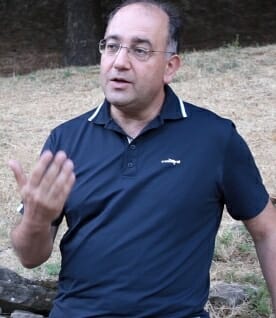
Jun 26, 2015 | Non categorizzato
published in Avvenire on 24/06/2015  The cries of many victims, of many who have been ‘discarded’, raises a question of justice which weighs heavily upon our capitalist system; a question that is all the more serious because it is no longer being seen or heard. Pope Francis is the only figure of authority on global moral issues, who due to his particular charism, is giving recognition and ear to today’s pressing ethical question (corporate social responsibility), in the face of which he is not afraid to raise radical questions (generated by his fraternal concern and love – agape ). No other ‘world organisation or body’ exists that is as free as he is from powerful economic and political forces, a freedom that not even the United Nations or the European Commission can lay claim to, let alone politicians at national level, who continue on in their practice of “selling a poor person for a pair of sandals – (Book of Amos), as indeed Italy is at risk of doing with its introduction of new gambling laws. A number of commentators, self-professed supporters of the free market economy, claim that the Encyclical Laudato si’ is opposed to it ; that not only is it a statement against modernism, but a reflection of the Pope’s own Marxist views, going almost as far as predicting a global environmental catastrophe. But far from it. In fact, it does just the opposite. Pope Francis focuses on reminding us that both markets and business enterprise are precious allies of the common good as long as they do not become the ‘only rule’; or that the ‘part’ (the market) does not try to become the whole (life itself). The global market is a necessary part of the life of society which contributes to the common good (there are many examples quoted of responsible business owners and technology being used at the serving of the economy and providing employment). However, it is not the full story, nor the most important. Pope Francis also seeks to remind all participants of the global economy of their vocation to reciprocity and “mutual benefit“. It is on this basis that he criticises companies who exploit (all too often) people and land; by doing so, they negate the very nature of what the global economy is supposed to be, increasing their wealth at the expense of impoverishing other weaker players.
The cries of many victims, of many who have been ‘discarded’, raises a question of justice which weighs heavily upon our capitalist system; a question that is all the more serious because it is no longer being seen or heard. Pope Francis is the only figure of authority on global moral issues, who due to his particular charism, is giving recognition and ear to today’s pressing ethical question (corporate social responsibility), in the face of which he is not afraid to raise radical questions (generated by his fraternal concern and love – agape ). No other ‘world organisation or body’ exists that is as free as he is from powerful economic and political forces, a freedom that not even the United Nations or the European Commission can lay claim to, let alone politicians at national level, who continue on in their practice of “selling a poor person for a pair of sandals – (Book of Amos), as indeed Italy is at risk of doing with its introduction of new gambling laws. A number of commentators, self-professed supporters of the free market economy, claim that the Encyclical Laudato si’ is opposed to it ; that not only is it a statement against modernism, but a reflection of the Pope’s own Marxist views, going almost as far as predicting a global environmental catastrophe. But far from it. In fact, it does just the opposite. Pope Francis focuses on reminding us that both markets and business enterprise are precious allies of the common good as long as they do not become the ‘only rule’; or that the ‘part’ (the market) does not try to become the whole (life itself). The global market is a necessary part of the life of society which contributes to the common good (there are many examples quoted of responsible business owners and technology being used at the serving of the economy and providing employment). However, it is not the full story, nor the most important. Pope Francis also seeks to remind all participants of the global economy of their vocation to reciprocity and “mutual benefit“. It is on this basis that he criticises companies who exploit (all too often) people and land; by doing so, they negate the very nature of what the global economy is supposed to be, increasing their wealth at the expense of impoverishing other weaker players.  On a second level, Pope Francis raises an issue that has been systematically neglected: the notion of “efficiency“, globalization’s new “in-word”, as being solely about technology and therefore ethically neutral, cannot be upheld (34). The calculation of cost-benefits (cost justifications), which underpin every ‘rational’ decision by companies and public administration, depends precisely upon what we choose to include in the costs and perceive in the benefits. For decades we have considered companies ‘efficient’ who neglected to include in their costs any damage done to the sea, rivers or atmosphere. The Pope invites us to enlarge our calculations to all types of species, including them as part of our cosmic fraternity, extending this reciprocity to all creatures, giving them a voice in our economic and political budgets. But there is still a third level. Even after acknowledging “mutual benefit ” as the fundamental law of civil society, extending it to include our relationship with all living species and with the earth, it cannot and must not be regarded as the only law in respect of life. Though important, it is not all there is. Indian economist and philosopher Amartya Sen, refers also to “duties of power“. We have a responsibility towards creation because technology is new form of power, the outcome of which can have unilaterally serious consequences for other living creatures to which we are all linked. The universe is filled with living things and this calls for responsibility. Moreover, there are times when moral duties come before benefits; the concept of “mutual benefit” does not cover the full spectrum of responsibility and justice. Even the best market, if it becomes the only criteria, may grow into a monster. There is no economic logic that convinces us to leave forests intact for those to come in thousands of years’ time, and yet we have moral obligations towards the future generations who will inherit and inhabit our earth. The question of ‘ecological debt‘ (51), is one of the most significant and most prophetic passages of the whole Encyclical. The widespread indiscriminate accumulation of national debt can bring entire nations to their knees (as in the case of Greece), and hold many others to ransom. Much aggression is used in the name of debt and credit. Yet a great ‘ecological debt‘ exists between North and South, between the 10% of humanity which has increased its wealth, whilst burdening everyone with the cost to the atmosphere, and continuing to contribute to “climate change”. The term “climate change” is itself misleading, as it is ethically neutral. The Pope, instead, speaks of “pollution” and the deterioration of that common good which is our climate (23). Climate deterioration contributes to the desertification of entire regions, having a direct impact on poverty, causing deaths and the migration of peoples (25). It is this ‘debt of ecology and justice’ that we fail to take into account when we close our borders to the many thousands who arrive because we have burned their houses as a result of our actions. This ecological debt seems to count for nothing in the political world order, there is no Troika to condemn one country for polluting or causing the desertification of another country and so the ‘ecological debt‘ to which the great and the powerful are increasingly indifferent, continues to rise. Lastly, a word of advice, to whoever has yet to read this wonderful encyclical, do not be tempted to read it sitting at your desk or relaxing on the sofa. Go out into the middle of a field or into the woods, to begin your meditation on this canticle of Pope Francis. The earth he speaks of is real and tangible, filled with the sights, sounds and scents of an earth that is loved. Then, go to a poor area on the margins of society, to conclude your reading, surrounded by poor people, and look at the world with its rich and greedy living, with poor beggars on its doorstep and embrace at least one of them, like Pope Francis. It is from such places as these that we will learn once again to be ‘in awe‘ (11) of the marvels of the earth and of fellow human beings. Perhaps then we will understand and pray the words “Praise be to you“.
On a second level, Pope Francis raises an issue that has been systematically neglected: the notion of “efficiency“, globalization’s new “in-word”, as being solely about technology and therefore ethically neutral, cannot be upheld (34). The calculation of cost-benefits (cost justifications), which underpin every ‘rational’ decision by companies and public administration, depends precisely upon what we choose to include in the costs and perceive in the benefits. For decades we have considered companies ‘efficient’ who neglected to include in their costs any damage done to the sea, rivers or atmosphere. The Pope invites us to enlarge our calculations to all types of species, including them as part of our cosmic fraternity, extending this reciprocity to all creatures, giving them a voice in our economic and political budgets. But there is still a third level. Even after acknowledging “mutual benefit ” as the fundamental law of civil society, extending it to include our relationship with all living species and with the earth, it cannot and must not be regarded as the only law in respect of life. Though important, it is not all there is. Indian economist and philosopher Amartya Sen, refers also to “duties of power“. We have a responsibility towards creation because technology is new form of power, the outcome of which can have unilaterally serious consequences for other living creatures to which we are all linked. The universe is filled with living things and this calls for responsibility. Moreover, there are times when moral duties come before benefits; the concept of “mutual benefit” does not cover the full spectrum of responsibility and justice. Even the best market, if it becomes the only criteria, may grow into a monster. There is no economic logic that convinces us to leave forests intact for those to come in thousands of years’ time, and yet we have moral obligations towards the future generations who will inherit and inhabit our earth. The question of ‘ecological debt‘ (51), is one of the most significant and most prophetic passages of the whole Encyclical. The widespread indiscriminate accumulation of national debt can bring entire nations to their knees (as in the case of Greece), and hold many others to ransom. Much aggression is used in the name of debt and credit. Yet a great ‘ecological debt‘ exists between North and South, between the 10% of humanity which has increased its wealth, whilst burdening everyone with the cost to the atmosphere, and continuing to contribute to “climate change”. The term “climate change” is itself misleading, as it is ethically neutral. The Pope, instead, speaks of “pollution” and the deterioration of that common good which is our climate (23). Climate deterioration contributes to the desertification of entire regions, having a direct impact on poverty, causing deaths and the migration of peoples (25). It is this ‘debt of ecology and justice’ that we fail to take into account when we close our borders to the many thousands who arrive because we have burned their houses as a result of our actions. This ecological debt seems to count for nothing in the political world order, there is no Troika to condemn one country for polluting or causing the desertification of another country and so the ‘ecological debt‘ to which the great and the powerful are increasingly indifferent, continues to rise. Lastly, a word of advice, to whoever has yet to read this wonderful encyclical, do not be tempted to read it sitting at your desk or relaxing on the sofa. Go out into the middle of a field or into the woods, to begin your meditation on this canticle of Pope Francis. The earth he speaks of is real and tangible, filled with the sights, sounds and scents of an earth that is loved. Then, go to a poor area on the margins of society, to conclude your reading, surrounded by poor people, and look at the world with its rich and greedy living, with poor beggars on its doorstep and embrace at least one of them, like Pope Francis. It is from such places as these that we will learn once again to be ‘in awe‘ (11) of the marvels of the earth and of fellow human beings. Perhaps then we will understand and pray the words “Praise be to you“.
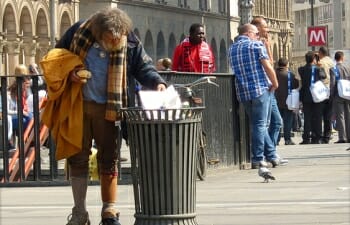
Jun 26, 2015 | Non categorizzato
 Sobriety “Every morning, before taking the bus, I walk part of the way on foot and am often drawn by the same scene: men and women, children and elderly, dressed with dignity, all equipped with shopping carts and rods, fishing for a bit of everything from the rubbish bins. They teach me something in their own way. As a Christian, I try to remain attentive to what is essential and to avoid waste: to opt for sobriety, recycling, answering with a firm ‘no’ every time consumerism tempts me with its offerings.” (Emilie – Italy) The Grandmother “’Love your enemies.’ This sentence from the Gospel shocked me because – thinking about it – I also have an enemy: the Grandmother whom my family hasn’t visited in because of old misunderstandings. When I heard that she wasn’t well, I thought I would go to visit her. My parents were amazed that I had suddenly remembered her. They didn’t feel like going after so many years, but I wanted to be able to see her. When I went into her home, everyone looked at me amazed and treated me with coldness. It wasn’t easy, but I stepped up. Grandmother was not at all well. She was dozing, but when she awoke, I was able to say hello, and she embraced me. “You’re my grandson, I know you. I’m happy, happy. . . We both wept for joy. When I returned home, I convinced my parents, and we went back altogether to visit her. It was a very emotional moment! Not even a week later, Grandmother left us for Heaaven.” (S. A. – Pakistan) It was me “We were in the countryside. There was a little boy next door, named Tino who was living in a difficult environment; perhaps for this reason he is so violent towards our Andrea. One afternoon, I found Andrea’s new bicycle broken. Losing patience, I wanted to know who it had been. Shortly afterwards Andrea came in, downcast and dejected. ‘Mamma, I broke the bicycle.’ Greatly surprised, I had to shout at him before I forgave him. The next day, when we were alone talking, the boy confessed: “You know, Mamma, it was Tino who broke the bicycle. But you were so angry yesterday that I was frightened for him. They’re always shouting at him in his house. . .’”(I.P. – Brazil)
Sobriety “Every morning, before taking the bus, I walk part of the way on foot and am often drawn by the same scene: men and women, children and elderly, dressed with dignity, all equipped with shopping carts and rods, fishing for a bit of everything from the rubbish bins. They teach me something in their own way. As a Christian, I try to remain attentive to what is essential and to avoid waste: to opt for sobriety, recycling, answering with a firm ‘no’ every time consumerism tempts me with its offerings.” (Emilie – Italy) The Grandmother “’Love your enemies.’ This sentence from the Gospel shocked me because – thinking about it – I also have an enemy: the Grandmother whom my family hasn’t visited in because of old misunderstandings. When I heard that she wasn’t well, I thought I would go to visit her. My parents were amazed that I had suddenly remembered her. They didn’t feel like going after so many years, but I wanted to be able to see her. When I went into her home, everyone looked at me amazed and treated me with coldness. It wasn’t easy, but I stepped up. Grandmother was not at all well. She was dozing, but when she awoke, I was able to say hello, and she embraced me. “You’re my grandson, I know you. I’m happy, happy. . . We both wept for joy. When I returned home, I convinced my parents, and we went back altogether to visit her. It was a very emotional moment! Not even a week later, Grandmother left us for Heaaven.” (S. A. – Pakistan) It was me “We were in the countryside. There was a little boy next door, named Tino who was living in a difficult environment; perhaps for this reason he is so violent towards our Andrea. One afternoon, I found Andrea’s new bicycle broken. Losing patience, I wanted to know who it had been. Shortly afterwards Andrea came in, downcast and dejected. ‘Mamma, I broke the bicycle.’ Greatly surprised, I had to shout at him before I forgave him. The next day, when we were alone talking, the boy confessed: “You know, Mamma, it was Tino who broke the bicycle. But you were so angry yesterday that I was frightened for him. They’re always shouting at him in his house. . .’”(I.P. – Brazil)
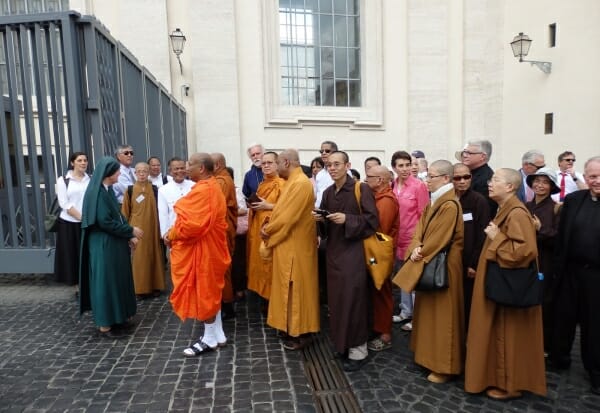
Jun 25, 2015 | Focolare Worldwide
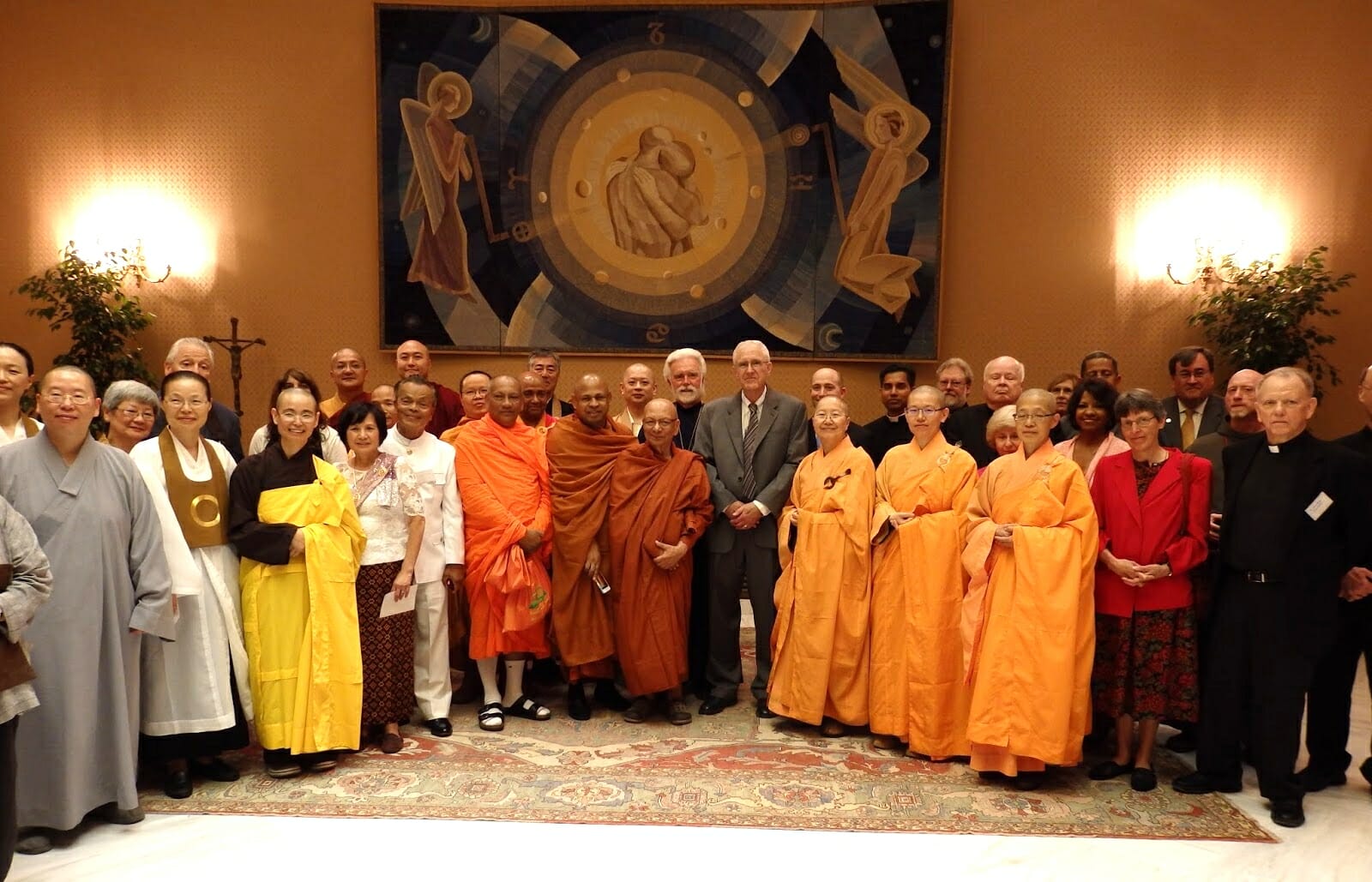 Buddhists and Catholics from the United States are holding an interreligious dialogue meeting for the first time near Rome this week, focused on the themes of ‘Suffering, Liberation and Fraternity’. The five day meeting, which opened on Tuesday at the headquarters of the Focolare Movement in Castelgandolfo, Italy, includes 46 Buddhist and Catholic participants from New York, Chicago, San Francisco, Los Angeles and Washington D.C. In an opening address to the group, which will meet with Pope Francis on Wednesday, the president of the Pontifical Council for Interreligious Dialogue, Cardinal Jean-Louis Tauran said “in a world where diversity is seen as a threat”, the encounter is “a sign of our openness towards one another and our commitment to human fraternity”. “We are all pilgrims”, he stressed, adding that the dialogue between Buddhists and Catholics is part of “our ongoing quest to grasp the mystery of our lives and the ultimate Truth”. To find out more about this dialogue, jointly sponsored by the PCID and the U.S. Bishops’ Committee for Ecumenical and Interreligious Affairs, Philippa Hitchen spoke to one of the Catholic participants, Fr Leo Lefebure, a theology professor at the Jesuit Georgetown University. Listen to audio recording Buddhists and Catholics from the United States are taking part in a meeting for the first time this week, focused on the themes of ‘Suffering, Liberation and Fraternity’. The five day event, which opened today (Tuesday) at the headquarters of the Focolare movement in Castelgandolfo, includes 46 Buddhist and Catholic participants from New York, Chicago, San Francisco, Los Angeles and Washington DC. In his opening address to the group, which will meet with Pope Francis on Wednesday, the president of the Pontifical Council for Interreligious Dialogue (PCID) Cardinal Jean-Louis Tauran said: “in a world where diversity is seen as a threat”, the encounter is “a sign of our openness towards one another and our commitment to human fraternity.” “We are all pilgrims”, he stressed, adding that the dialogue between Buddhists and Catholics is part of “our ongoing quest to grasp the mystery of our lives and the ultimate Truth”. The meeting is jointly sponsored by the PCID and the US Bishops’ Committee for Ecumenical and Interreligious Affairs. In an interview with Philippa Hitchens on Vatican Radio, one of the participants, Fr Leo Lefebure SJ, a theology professor at Georgetown University said the PCID asked the US Conference of Catholic Bishops to begin a new series of conversations focused on the theme of ‘Be friends and help the world’ so the dialogue will explore beliefs and ideas that “resonate across both traditions”, especially the concepts of ‘suffering and the end of suffering’.
Buddhists and Catholics from the United States are holding an interreligious dialogue meeting for the first time near Rome this week, focused on the themes of ‘Suffering, Liberation and Fraternity’. The five day meeting, which opened on Tuesday at the headquarters of the Focolare Movement in Castelgandolfo, Italy, includes 46 Buddhist and Catholic participants from New York, Chicago, San Francisco, Los Angeles and Washington D.C. In an opening address to the group, which will meet with Pope Francis on Wednesday, the president of the Pontifical Council for Interreligious Dialogue, Cardinal Jean-Louis Tauran said “in a world where diversity is seen as a threat”, the encounter is “a sign of our openness towards one another and our commitment to human fraternity”. “We are all pilgrims”, he stressed, adding that the dialogue between Buddhists and Catholics is part of “our ongoing quest to grasp the mystery of our lives and the ultimate Truth”. To find out more about this dialogue, jointly sponsored by the PCID and the U.S. Bishops’ Committee for Ecumenical and Interreligious Affairs, Philippa Hitchen spoke to one of the Catholic participants, Fr Leo Lefebure, a theology professor at the Jesuit Georgetown University. Listen to audio recording Buddhists and Catholics from the United States are taking part in a meeting for the first time this week, focused on the themes of ‘Suffering, Liberation and Fraternity’. The five day event, which opened today (Tuesday) at the headquarters of the Focolare movement in Castelgandolfo, includes 46 Buddhist and Catholic participants from New York, Chicago, San Francisco, Los Angeles and Washington DC. In his opening address to the group, which will meet with Pope Francis on Wednesday, the president of the Pontifical Council for Interreligious Dialogue (PCID) Cardinal Jean-Louis Tauran said: “in a world where diversity is seen as a threat”, the encounter is “a sign of our openness towards one another and our commitment to human fraternity.” “We are all pilgrims”, he stressed, adding that the dialogue between Buddhists and Catholics is part of “our ongoing quest to grasp the mystery of our lives and the ultimate Truth”. The meeting is jointly sponsored by the PCID and the US Bishops’ Committee for Ecumenical and Interreligious Affairs. In an interview with Philippa Hitchens on Vatican Radio, one of the participants, Fr Leo Lefebure SJ, a theology professor at Georgetown University said the PCID asked the US Conference of Catholic Bishops to begin a new series of conversations focused on the theme of ‘Be friends and help the world’ so the dialogue will explore beliefs and ideas that “resonate across both traditions”, especially the concepts of ‘suffering and the end of suffering’.  He noted that the basic values and virtues of Buddhists and Catholics “converge to a great degree” and there is a long history in the United States of leaders of both traditions coming together to oppose violence and work towards peaceful transformation of conflict. Fr Leo says that every major urban area in the US has large immigrant populations from Asia, so part of the Buddhist population is made up of these people. Another part includes people who have converted from other faiths, especially from Judaism and Christianity. What is sometimes controversial, he notes, is that some see themselves as ‘practitioners of both their religion of origin and some form of Buddhist tradition’. But many Catholics, he says, find their faith much enhanced by practices such as meditation – in a survey of Christians in the US who engage in some form of meditation, he says most found their own faith experience ‘profoundly deepened’ by these practices… Fr Leo says it was very significant that this meeting is taking place in the year that we mark the 50th anniversary of Nostra Aetate, the document that for the first time described Buddhism and said the Catholic Church “rejects nothing of what is true and holy” in these traditions, “implying there are things we can learn from them.” Source Vatican Radio
He noted that the basic values and virtues of Buddhists and Catholics “converge to a great degree” and there is a long history in the United States of leaders of both traditions coming together to oppose violence and work towards peaceful transformation of conflict. Fr Leo says that every major urban area in the US has large immigrant populations from Asia, so part of the Buddhist population is made up of these people. Another part includes people who have converted from other faiths, especially from Judaism and Christianity. What is sometimes controversial, he notes, is that some see themselves as ‘practitioners of both their religion of origin and some form of Buddhist tradition’. But many Catholics, he says, find their faith much enhanced by practices such as meditation – in a survey of Christians in the US who engage in some form of meditation, he says most found their own faith experience ‘profoundly deepened’ by these practices… Fr Leo says it was very significant that this meeting is taking place in the year that we mark the 50th anniversary of Nostra Aetate, the document that for the first time described Buddhism and said the Catholic Church “rejects nothing of what is true and holy” in these traditions, “implying there are things we can learn from them.” Source Vatican Radio
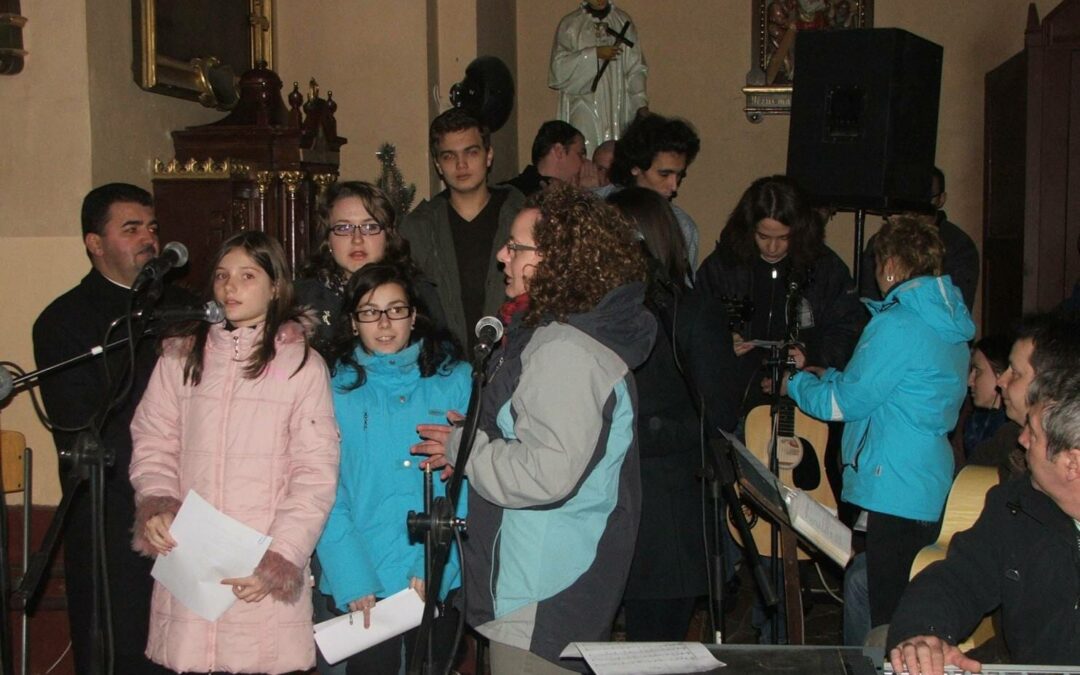
Jun 25, 2015 | Non categorizzato
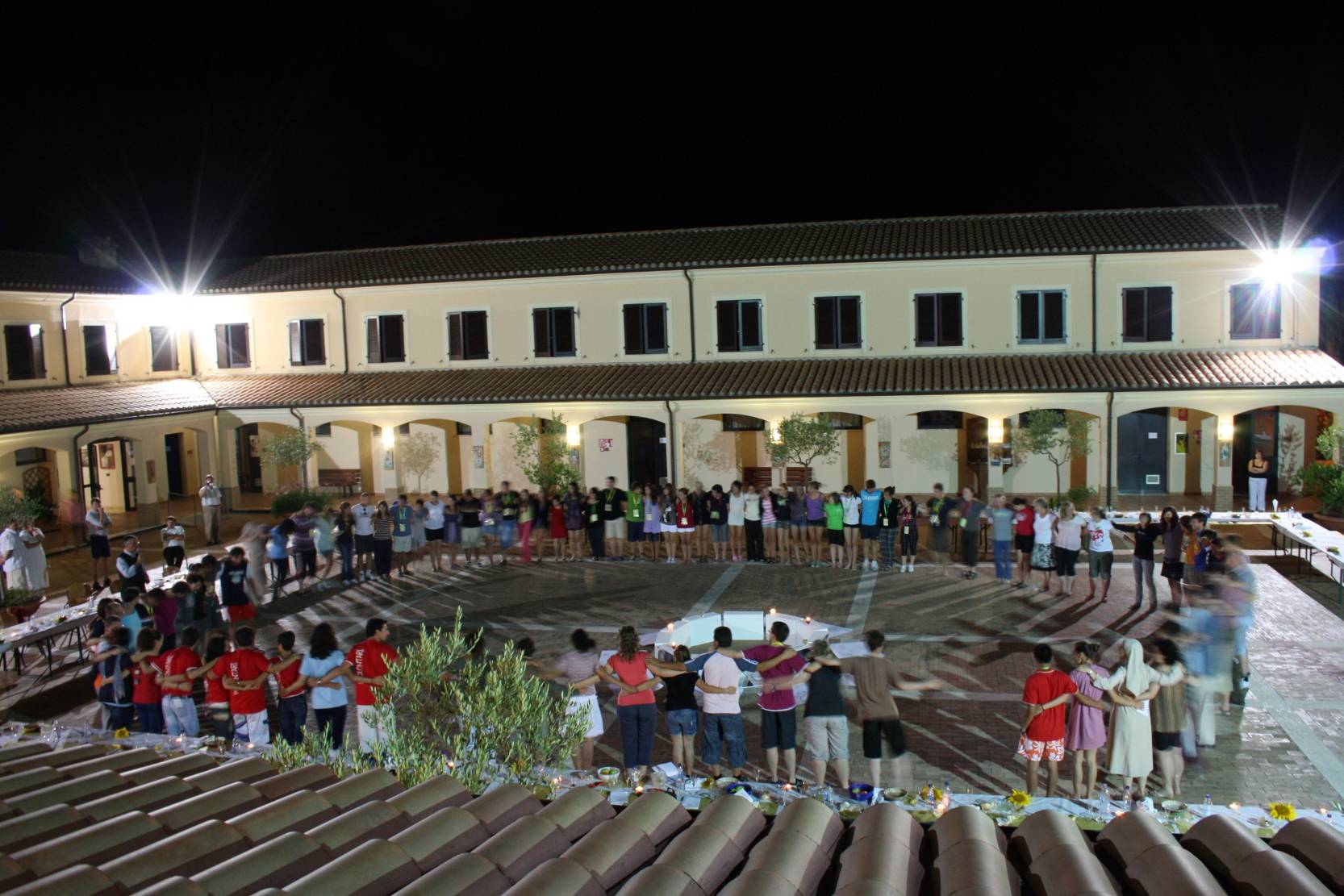 “The Bishop had assigned me to work in the council for ecumenism and dialogue. Fifteen years ago, when a priest-friend of mine from the nearby diocese of Fano came up with the proposal of an inter-diocesan project to promote Ecumenical Twinning between European parishes, I had said no.“As Fr. Giorgio Paolini recounts, this hesitation was soon resolved when he recalled that in London in 1996, Chiara Lubich launched an invitation to live an “ecumenism of the people,” an “ecumenism of life” (video). “So I resumed my contacts with my friend from Fano and together with other priest-friends we threw ourselves into the ecumenical twinning experience.” The first parish they contacted was the Orthodox parish of Fr Nicu in Romania. «The fraternal relationship among us generated an educational cooperation between the youth of the Diocesan Movement of the Marche region and his youth, and which spread out in concentric rings with the sharing of the Word of Life and the spirituality of unity between the Catholic and Orthodox youth through frequent meetings. The two important yearly meetings each year were held at Christmas in Rumania and in summer in Italy Then came the annual experience of the Ecumenical Youth Meeting in Loreto, organised together with the Head of the John Paul II Centre of Montorso (Loreto), who had proposed the creation of an ecumenical camp with all the youth contacted through the ecumenical twinning, but also open to all, to allow us to share the mutual wealth of our churches of origin. This year, from 29 July to 4 August, the seventh edition will take place and which foresees the participation of over 200 Orthodox and Greek Catholic youth from Rumania, Lutherans from Denmark and Sweden, Anglicans from England and Catholics from Italy.”
“The Bishop had assigned me to work in the council for ecumenism and dialogue. Fifteen years ago, when a priest-friend of mine from the nearby diocese of Fano came up with the proposal of an inter-diocesan project to promote Ecumenical Twinning between European parishes, I had said no.“As Fr. Giorgio Paolini recounts, this hesitation was soon resolved when he recalled that in London in 1996, Chiara Lubich launched an invitation to live an “ecumenism of the people,” an “ecumenism of life” (video). “So I resumed my contacts with my friend from Fano and together with other priest-friends we threw ourselves into the ecumenical twinning experience.” The first parish they contacted was the Orthodox parish of Fr Nicu in Romania. «The fraternal relationship among us generated an educational cooperation between the youth of the Diocesan Movement of the Marche region and his youth, and which spread out in concentric rings with the sharing of the Word of Life and the spirituality of unity between the Catholic and Orthodox youth through frequent meetings. The two important yearly meetings each year were held at Christmas in Rumania and in summer in Italy Then came the annual experience of the Ecumenical Youth Meeting in Loreto, organised together with the Head of the John Paul II Centre of Montorso (Loreto), who had proposed the creation of an ecumenical camp with all the youth contacted through the ecumenical twinning, but also open to all, to allow us to share the mutual wealth of our churches of origin. This year, from 29 July to 4 August, the seventh edition will take place and which foresees the participation of over 200 Orthodox and Greek Catholic youth from Rumania, Lutherans from Denmark and Sweden, Anglicans from England and Catholics from Italy.” 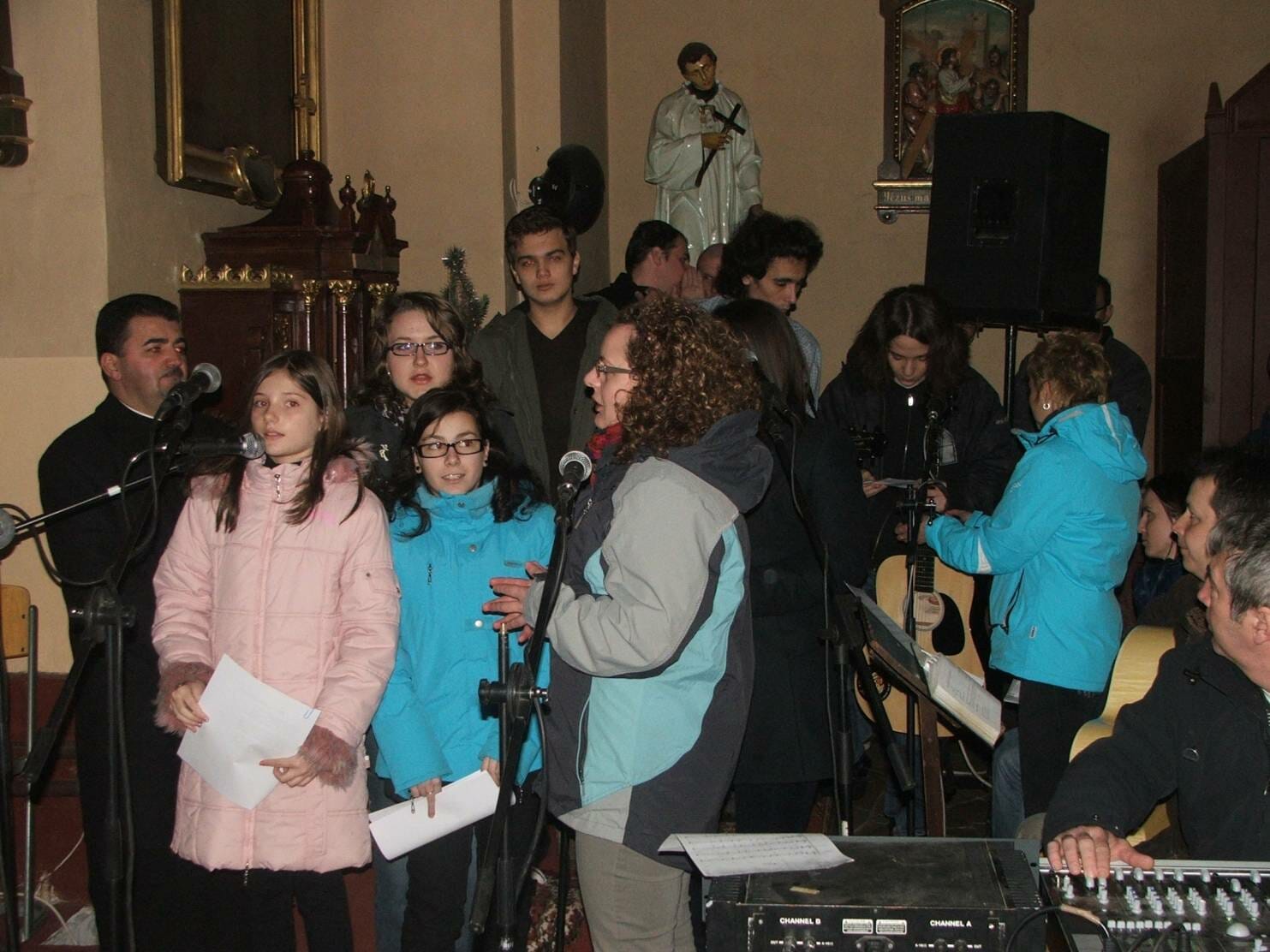 Lastly, the promotion of the “culture of dialogue” among the youth. In January this year, during the Week of Prayer for Unity of Christians, for example, the parish of Borgo Santa Maria hosted around 20 Rumanian boys and girls of a parish it is twinned with. Together with the Italian youth of the Ecumenical Meeting, they then met with the students of four high schools in the provinces of Pesaro and Urbino. Barbara, spokesperson for a family of the parish continued with the story: “In a world oppressed by wars, divisions and terrorism, these boys and girls wished to propose and offer a message of joy and hope, and certainly a new culture of relationships and encounter that help us to comprehend that in the diversity of others we can discover that richness which brings unity and not division. After watching a film and listening to the testimonials of the youth, the Ecumenical Meeting broke up into groups to get to know the Romanian youth better, through a question-and-answer session. Despite language difficulties they did their best to communicate with one another. As a family we participated in these meetings as observers, but we feel that we have to thank all those who believed in this project, and continue to do so. I thank the parish priests and the Deans of the high schools, but above all God, who in his immense love made us come across such youth, motivated and determined to change things. They can count on our support and we have faith that they will be able to involve more and more young people, and create a better world where all can live in peace and harmony.”
Lastly, the promotion of the “culture of dialogue” among the youth. In January this year, during the Week of Prayer for Unity of Christians, for example, the parish of Borgo Santa Maria hosted around 20 Rumanian boys and girls of a parish it is twinned with. Together with the Italian youth of the Ecumenical Meeting, they then met with the students of four high schools in the provinces of Pesaro and Urbino. Barbara, spokesperson for a family of the parish continued with the story: “In a world oppressed by wars, divisions and terrorism, these boys and girls wished to propose and offer a message of joy and hope, and certainly a new culture of relationships and encounter that help us to comprehend that in the diversity of others we can discover that richness which brings unity and not division. After watching a film and listening to the testimonials of the youth, the Ecumenical Meeting broke up into groups to get to know the Romanian youth better, through a question-and-answer session. Despite language difficulties they did their best to communicate with one another. As a family we participated in these meetings as observers, but we feel that we have to thank all those who believed in this project, and continue to do so. I thank the parish priests and the Deans of the high schools, but above all God, who in his immense love made us come across such youth, motivated and determined to change things. They can count on our support and we have faith that they will be able to involve more and more young people, and create a better world where all can live in peace and harmony.”

Jun 24, 2015 | Non categorizzato
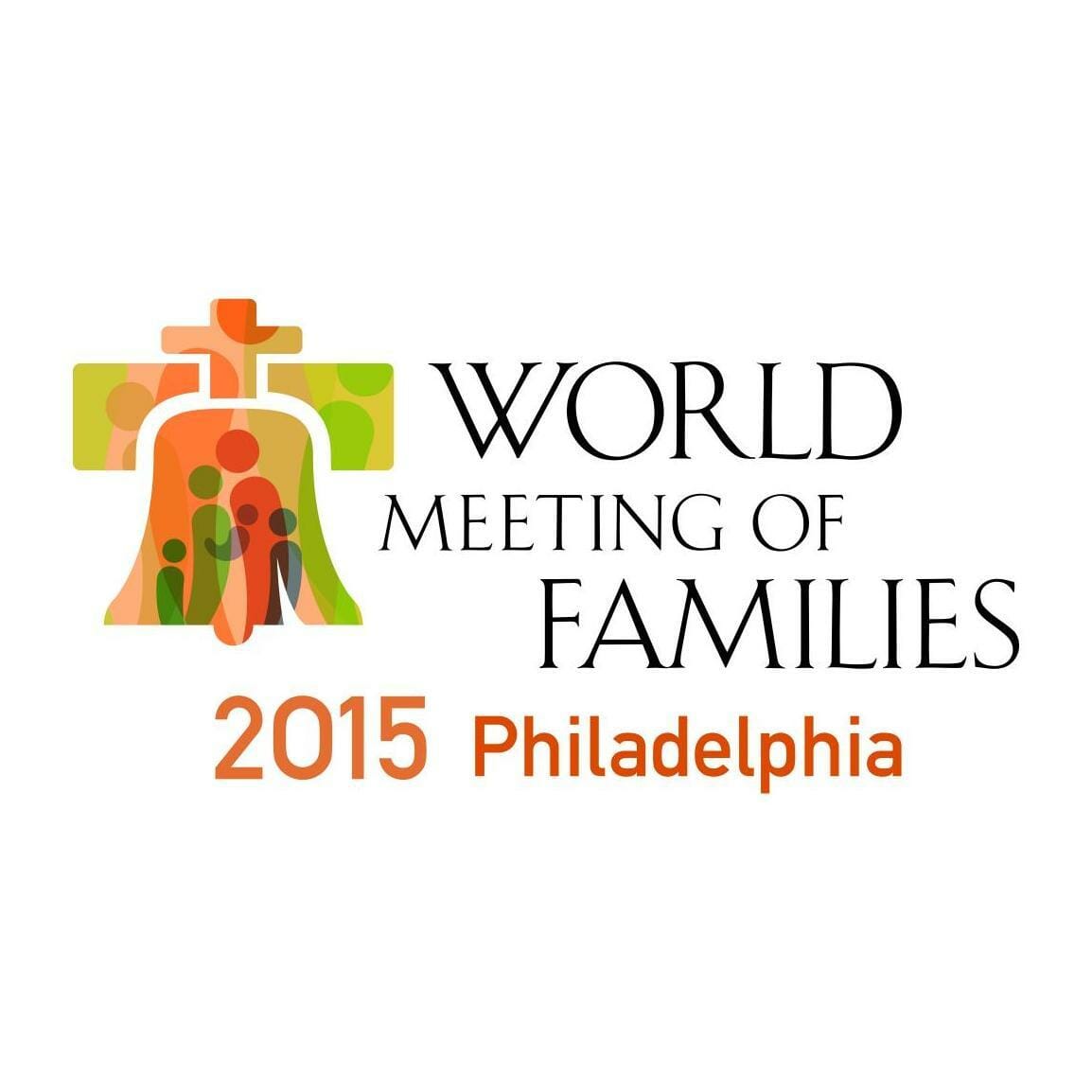 Love is our mission: This is the title of the 8th World Meeting of Families (WMOF), which will begin with a Congress (from September 22nd to 25th) held by experts from all over the world and which will take place at the Pennsylvania Convention Center, a structure which can hold up to 50,000 people. In the meantime, Pope Francis will travel to the headquarters of the UN in New York City and to that of the U.S. Congress in Washington, D.C., having been invited, for the first time in his pontificate, to speak in such important civil locations. The Holy Father will arrive on the stage of the WMOF, which will be set up on the spectacular stairs of the Philadelphia Museum of Art, on Saturday, September 26th. With this evocative backdrop, he will meet with families from all over the world, in a sequence of life experiences interposed with performances by international artists: a Festival-Testimonial which will be shown on TV worldwide and will culminate with the words of the Pope. The WMOF will conclude the following day, Sunday September 27th, with the solemn Eucharistic celebration, at which the pope will preside. More than one million people are expected to participate. Besides the numerous families of the Focolare from all over America, Marly and Hans-Peter Stasch from the International Office of New Families, and Anna and Alberto Friso, members of the Pontifical Council for the Family, will participate at the event.
Love is our mission: This is the title of the 8th World Meeting of Families (WMOF), which will begin with a Congress (from September 22nd to 25th) held by experts from all over the world and which will take place at the Pennsylvania Convention Center, a structure which can hold up to 50,000 people. In the meantime, Pope Francis will travel to the headquarters of the UN in New York City and to that of the U.S. Congress in Washington, D.C., having been invited, for the first time in his pontificate, to speak in such important civil locations. The Holy Father will arrive on the stage of the WMOF, which will be set up on the spectacular stairs of the Philadelphia Museum of Art, on Saturday, September 26th. With this evocative backdrop, he will meet with families from all over the world, in a sequence of life experiences interposed with performances by international artists: a Festival-Testimonial which will be shown on TV worldwide and will culminate with the words of the Pope. The WMOF will conclude the following day, Sunday September 27th, with the solemn Eucharistic celebration, at which the pope will preside. More than one million people are expected to participate. Besides the numerous families of the Focolare from all over America, Marly and Hans-Peter Stasch from the International Office of New Families, and Anna and Alberto Friso, members of the Pontifical Council for the Family, will participate at the event.
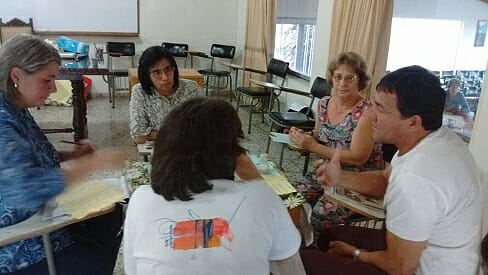
Jun 24, 2015 | Non categorizzato
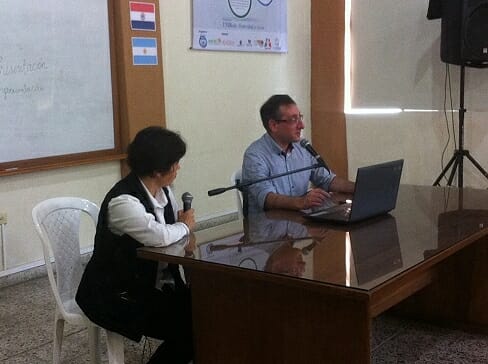 In 2013 the Colombian city of Medellín, with its 2.4 million inhabitants, was recognised as the city that achieved the most rapid modernisation process in the world, also due to the developments undertaken over the last years, like for example, the drop in carbon dioxide emissions, creation of cultural areas, and reduced criminality. The Mundo Mejor Foundation operates in Medellin and due to this was chosen as the seat of the 3rd UNIRedes Seminar, that was held from 3 – 7 June. There were representatives of over 30 organisations from Brazil, Mexico, Argentina, Bolivia, Paraguay, Venezuela and Colombia, with the addition of other 10 countries that participated via streaming. During this seminar the various social organisations inspired by the spirituality of unity accepted the challenge to strengthen their joint efforts. Anabel Abascal, member of the Coordinating Committee affirmed: “As social associations members of the UNIRedes believe that, in society today, working within a network is the only way in which we can call attention to universal fraternity which is our source of inspiration.” The discussions of the four-day meeting revolved around the tools available to be able to best respond, with daily work, to the great social challenges. Susana Nuín, of the Episcopal Conference of Latin America (CELAM) illustrated the Regional Church’s viewpoint, by presenting the 4-crossroads for social intervention: care of nature, building of peace, migration and social justice. An Italian Professor, Giuseppe Milan, expounded on intercultural pedagogy based on the spirituality of Chiara Lubich – a pedagogy that recognises and takes upon itself the sufferings and needs present in social diversity. Milan affirmed: “The principle of education is fraternity, education of universal-men who centre on dialogue to build new societies. The methodology is the art of loving. Accepting all and respecting the different cultures.” The other themes undertaken were related to the institutional consolidation of the organisations and network management. To this end, Francesco Tortorella of AMU (Action for a United World), explained how the projects are designed, starting from the funding phase up to direct participation of the protagonists.
In 2013 the Colombian city of Medellín, with its 2.4 million inhabitants, was recognised as the city that achieved the most rapid modernisation process in the world, also due to the developments undertaken over the last years, like for example, the drop in carbon dioxide emissions, creation of cultural areas, and reduced criminality. The Mundo Mejor Foundation operates in Medellin and due to this was chosen as the seat of the 3rd UNIRedes Seminar, that was held from 3 – 7 June. There were representatives of over 30 organisations from Brazil, Mexico, Argentina, Bolivia, Paraguay, Venezuela and Colombia, with the addition of other 10 countries that participated via streaming. During this seminar the various social organisations inspired by the spirituality of unity accepted the challenge to strengthen their joint efforts. Anabel Abascal, member of the Coordinating Committee affirmed: “As social associations members of the UNIRedes believe that, in society today, working within a network is the only way in which we can call attention to universal fraternity which is our source of inspiration.” The discussions of the four-day meeting revolved around the tools available to be able to best respond, with daily work, to the great social challenges. Susana Nuín, of the Episcopal Conference of Latin America (CELAM) illustrated the Regional Church’s viewpoint, by presenting the 4-crossroads for social intervention: care of nature, building of peace, migration and social justice. An Italian Professor, Giuseppe Milan, expounded on intercultural pedagogy based on the spirituality of Chiara Lubich – a pedagogy that recognises and takes upon itself the sufferings and needs present in social diversity. Milan affirmed: “The principle of education is fraternity, education of universal-men who centre on dialogue to build new societies. The methodology is the art of loving. Accepting all and respecting the different cultures.” The other themes undertaken were related to the institutional consolidation of the organisations and network management. To this end, Francesco Tortorella of AMU (Action for a United World), explained how the projects are designed, starting from the funding phase up to direct participation of the protagonists.  To conclude, the working groups formed a new Coordinating Committee and the various working commissions that will have to pursue the various UNIRedes objectives: develop new communication strategies to intensify communion and diffusion of the various actions, giving visibility to the hope of diffusing the small, but important changes our actions generate in the lives of people; achieve a greater impact in the local public policies; weave new bonds of cooperation between organisations; work in such a way so as to give the beneficiaries of the project an active, leading role; incentivise reciprocity; promote social volunteer work as a strategy to improve the management of organizations and form a new humanity. The various discourses of the 3rd Seminar can be view via streaming and in the web page Sumá Fraternidad.
To conclude, the working groups formed a new Coordinating Committee and the various working commissions that will have to pursue the various UNIRedes objectives: develop new communication strategies to intensify communion and diffusion of the various actions, giving visibility to the hope of diffusing the small, but important changes our actions generate in the lives of people; achieve a greater impact in the local public policies; weave new bonds of cooperation between organisations; work in such a way so as to give the beneficiaries of the project an active, leading role; incentivise reciprocity; promote social volunteer work as a strategy to improve the management of organizations and form a new humanity. The various discourses of the 3rd Seminar can be view via streaming and in the web page Sumá Fraternidad.
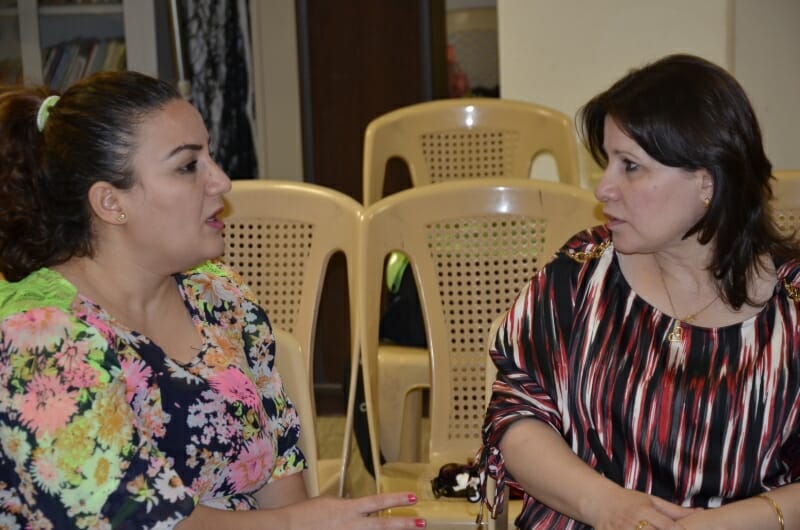
Jun 23, 2015 | Focolare Worldwide
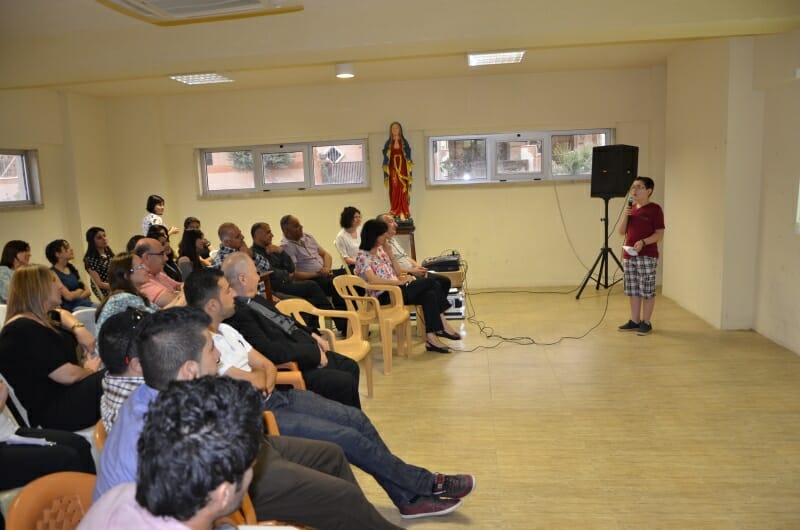 “Iraq is going through its worst period in ten years,” write Gemma and Pierre from the Focolare Movement in Jordan and Iraq, following their short trip to Erbil, Iraq. Their objective was to make the people there feel the closeness of the Focolare community that has been in that region for many years. “Being with them, even though we found them so tried and exhausted, we were struck by how their generosity towards others, and how they continue to believe in in God’s love.” “Nine months have passed since the villages of the Nineveh Plains were invaded by ISIS. The general situation of the country has worsened with recent developments, that is, the taking of new territories. The people, including our friends, feel a great sense of uncertainty about the future. Many have already fled the country and others are planning to do the same.” Spiritual closeness no small matter if, at the conclusion of the days together, one person confided: “We’ve lost everything, I wasn’t able to finish my university studies, there are no jobs . . . but finally, I have peace again, and I decided to begin my relationship with God again.” Pierre and Gemma recount: “During the meeting with the Focolare community there was one very important moment: it was when we openly declared our desire to give our lives for one another, to love each other with the measure of Jesus’s love, so that He could be present among us as He promises. Then we meditated on the link between the Eucharist and Church, using a 1982 talk by Chiara Lubich, The Eucharist makes the Church and the Church makes the Eucharist. We also met Archbishop Bashar Warda, Chaldean Catholic Archbishop of Erbil, who was pleased by our visit. In concluding he asked us to pray for Iraq like never before.”
“Iraq is going through its worst period in ten years,” write Gemma and Pierre from the Focolare Movement in Jordan and Iraq, following their short trip to Erbil, Iraq. Their objective was to make the people there feel the closeness of the Focolare community that has been in that region for many years. “Being with them, even though we found them so tried and exhausted, we were struck by how their generosity towards others, and how they continue to believe in in God’s love.” “Nine months have passed since the villages of the Nineveh Plains were invaded by ISIS. The general situation of the country has worsened with recent developments, that is, the taking of new territories. The people, including our friends, feel a great sense of uncertainty about the future. Many have already fled the country and others are planning to do the same.” Spiritual closeness no small matter if, at the conclusion of the days together, one person confided: “We’ve lost everything, I wasn’t able to finish my university studies, there are no jobs . . . but finally, I have peace again, and I decided to begin my relationship with God again.” Pierre and Gemma recount: “During the meeting with the Focolare community there was one very important moment: it was when we openly declared our desire to give our lives for one another, to love each other with the measure of Jesus’s love, so that He could be present among us as He promises. Then we meditated on the link between the Eucharist and Church, using a 1982 talk by Chiara Lubich, The Eucharist makes the Church and the Church makes the Eucharist. We also met Archbishop Bashar Warda, Chaldean Catholic Archbishop of Erbil, who was pleased by our visit. In concluding he asked us to pray for Iraq like never before.”  I have come for you, each one of you is like the whole world to me. . .” said Bishop Salomone Warduni, Auxiliary Bishop of Baghdad, from the Chaldean Catholic Church, who had travelled from Baghdad just to be at our gathering. He exhorted everyone: “Have no fear, carry on in the life of the ideal of unity, because each one of us has a mission to accomplish.” One person said: “I try live love in concrete ways until [love] becomes reciprocal within the community. In the Eucharist I find the strength to carry on loving.” Then there is the joy of being together. In spite of the situation there is very lively group children and teenagers who held a local edition of the Run4Unity sport relay for peace, with 35 boys and girls. “These were intense days for us,” conclude the two focolarini from Jordan, “a deep and divine experience. They gave much more to us than we were ever able to give to them. Who knows how much life must be coming from this suffering that is being lived in a Christian way.
I have come for you, each one of you is like the whole world to me. . .” said Bishop Salomone Warduni, Auxiliary Bishop of Baghdad, from the Chaldean Catholic Church, who had travelled from Baghdad just to be at our gathering. He exhorted everyone: “Have no fear, carry on in the life of the ideal of unity, because each one of us has a mission to accomplish.” One person said: “I try live love in concrete ways until [love] becomes reciprocal within the community. In the Eucharist I find the strength to carry on loving.” Then there is the joy of being together. In spite of the situation there is very lively group children and teenagers who held a local edition of the Run4Unity sport relay for peace, with 35 boys and girls. “These were intense days for us,” conclude the two focolarini from Jordan, “a deep and divine experience. They gave much more to us than we were ever able to give to them. Who knows how much life must be coming from this suffering that is being lived in a Christian way.

 Estelle is the eldest of eight brothers, in a family from Ivory Coast who, after having worked as a secretary at a medical clinic in Abidjan, moved to Man in 2006 where she volunteers especially as a contact person with sponsors of a medical centre run by the Focolare Movement. When the project finished, she decided to expand her administrative skills. Meanwhile, her father died and she had to provide financial support for the family. She applied for and received a scholarship from Fraternity with Africa. Now, along with working, she is specializing through distance learning courses in “Administration of NGO organisations and non-profit associations” at university in Burkina Faso. After finishing her studies, with the support of a tutor and of AMU, she will travel to Burundi where she will complete one stage in administration and finance at CASOBU, an NGO that promotes human and community development through acitivites and projects based on the values of sharing and sustainable development. “It was a nice concrete experience for me, because it was the first time I travelled outside Ivory Coast and got to know other cultures and learn much from CASOBU; their approach to microcredit, for example. When I returned to my own country, I decided to propose that same microcredit model, beginning with the people I knew. We’ve already begun two groups that up until now seem to be functioning quite well. . .“ Everything she received, spurred Estelle to become involved in Fraternity with Africa: “When I finished my studies, I thought that since I couldn’t make a financial contribution, I could share my time and talents with the project.” So, on the one hand there was the work in adminstration, running and finances of the medical centre, and on the other hand keep up relationships, taking care of the adminstration and, from within the adminstration, she evaluates scholarship candidates and accompanies the students who receive them.
Estelle is the eldest of eight brothers, in a family from Ivory Coast who, after having worked as a secretary at a medical clinic in Abidjan, moved to Man in 2006 where she volunteers especially as a contact person with sponsors of a medical centre run by the Focolare Movement. When the project finished, she decided to expand her administrative skills. Meanwhile, her father died and she had to provide financial support for the family. She applied for and received a scholarship from Fraternity with Africa. Now, along with working, she is specializing through distance learning courses in “Administration of NGO organisations and non-profit associations” at university in Burkina Faso. After finishing her studies, with the support of a tutor and of AMU, she will travel to Burundi where she will complete one stage in administration and finance at CASOBU, an NGO that promotes human and community development through acitivites and projects based on the values of sharing and sustainable development. “It was a nice concrete experience for me, because it was the first time I travelled outside Ivory Coast and got to know other cultures and learn much from CASOBU; their approach to microcredit, for example. When I returned to my own country, I decided to propose that same microcredit model, beginning with the people I knew. We’ve already begun two groups that up until now seem to be functioning quite well. . .“ Everything she received, spurred Estelle to become involved in Fraternity with Africa: “When I finished my studies, I thought that since I couldn’t make a financial contribution, I could share my time and talents with the project.” So, on the one hand there was the work in adminstration, running and finances of the medical centre, and on the other hand keep up relationships, taking care of the adminstration and, from within the adminstration, she evaluates scholarship candidates and accompanies the students who receive them.  The medical centre in Man began in 2002, during the civil war when the hospital was closed. It was hosted in an apartment with three rooms. Then, in 2008, the current Social Medical Centre was opened with visiting rooms, one-day recovery rooms, pharmacy and laboratory. But now the number of patients has gown so much that a new centre is being constructed where diagnostic facilities will be added, and programmes for the reduction of infant malnutrition in the region of Man. There will also be training programmes for mothers, in the field of nutrition. The health situation of the people in Man is problematic. Medical bills are paid in advance and without the possiblity of riembursement. Given the poverty of the population, families are generally able to cover the cost of food and school fees. But if illness comes knocking, they only go the doctor when the illness is at its worst, and the patient is dying. The new medical centre will be able offer medical care to six thousand adult patients and three thousand children. See: AMU notizie 2/2015
The medical centre in Man began in 2002, during the civil war when the hospital was closed. It was hosted in an apartment with three rooms. Then, in 2008, the current Social Medical Centre was opened with visiting rooms, one-day recovery rooms, pharmacy and laboratory. But now the number of patients has gown so much that a new centre is being constructed where diagnostic facilities will be added, and programmes for the reduction of infant malnutrition in the region of Man. There will also be training programmes for mothers, in the field of nutrition. The health situation of the people in Man is problematic. Medical bills are paid in advance and without the possiblity of riembursement. Given the poverty of the population, families are generally able to cover the cost of food and school fees. But if illness comes knocking, they only go the doctor when the illness is at its worst, and the patient is dying. The new medical centre will be able offer medical care to six thousand adult patients and three thousand children. See: AMU notizie 2/2015


 The cries of many victims, of many who have been ‘discarded’, raises a question of justice which weighs heavily upon our capitalist system; a question that is all the more serious because it is no longer being seen or heard. Pope Francis is the only figure of authority on global moral issues, who due to his particular charism, is giving recognition and ear to today’s pressing ethical question (corporate social responsibility), in the face of which he is not afraid to raise radical questions (generated by his fraternal concern and love – agape ). No other ‘world organisation or body’ exists that is as free as he is from powerful economic and political forces, a freedom that not even the United Nations or the European Commission can lay claim to, let alone politicians at national level, who continue on in their practice of “selling a poor person for a pair of sandals – (Book of Amos), as indeed Italy is at risk of doing with its introduction of new gambling laws. A number of commentators, self-professed supporters of the free market economy, claim that the Encyclical Laudato si’ is opposed to it ; that not only is it a statement against modernism, but a reflection of the Pope’s own Marxist views, going almost as far as predicting a global environmental catastrophe. But far from it. In fact, it does just the opposite. Pope Francis focuses on reminding us that both markets and business enterprise are precious allies of the common good as long as they do not become the ‘only rule’; or that the ‘part’ (the market) does not try to become the whole (life itself). The global market is a necessary part of the life of society which contributes to the common good (there are many examples quoted of responsible business owners and technology being used at the serving of the economy and providing employment). However, it is not the full story, nor the most important. Pope Francis also seeks to remind all participants of the global economy of their vocation to reciprocity and “mutual benefit“. It is on this basis that he criticises companies who exploit (all too often) people and land; by doing so, they negate the very nature of what the global economy is supposed to be, increasing their wealth at the expense of impoverishing other weaker players.
The cries of many victims, of many who have been ‘discarded’, raises a question of justice which weighs heavily upon our capitalist system; a question that is all the more serious because it is no longer being seen or heard. Pope Francis is the only figure of authority on global moral issues, who due to his particular charism, is giving recognition and ear to today’s pressing ethical question (corporate social responsibility), in the face of which he is not afraid to raise radical questions (generated by his fraternal concern and love – agape ). No other ‘world organisation or body’ exists that is as free as he is from powerful economic and political forces, a freedom that not even the United Nations or the European Commission can lay claim to, let alone politicians at national level, who continue on in their practice of “selling a poor person for a pair of sandals – (Book of Amos), as indeed Italy is at risk of doing with its introduction of new gambling laws. A number of commentators, self-professed supporters of the free market economy, claim that the Encyclical Laudato si’ is opposed to it ; that not only is it a statement against modernism, but a reflection of the Pope’s own Marxist views, going almost as far as predicting a global environmental catastrophe. But far from it. In fact, it does just the opposite. Pope Francis focuses on reminding us that both markets and business enterprise are precious allies of the common good as long as they do not become the ‘only rule’; or that the ‘part’ (the market) does not try to become the whole (life itself). The global market is a necessary part of the life of society which contributes to the common good (there are many examples quoted of responsible business owners and technology being used at the serving of the economy and providing employment). However, it is not the full story, nor the most important. Pope Francis also seeks to remind all participants of the global economy of their vocation to reciprocity and “mutual benefit“. It is on this basis that he criticises companies who exploit (all too often) people and land; by doing so, they negate the very nature of what the global economy is supposed to be, increasing their wealth at the expense of impoverishing other weaker players. 










